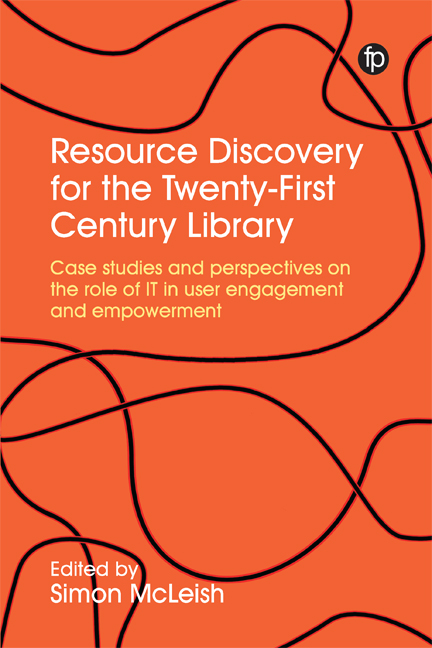Book contents
- Frontmatter
- Contents
- Figures and Tables
- Contributors
- Foreword: Library Discovery Directions
- 1 Introduction: Technology and Resource Discovery
- 2 Flipping the Catalogue: Taking Resource Discovery to the Next Level
- 3 Breaking the Record: Liberating Data into Knowledge at the National Library Board of Singapore
- 4 Case Study: Clearing Library Discovery-to-Access Pathways for IEEE Content
- 5 Case Study: Putting Discovery at the Heart of the Library Experience
- 6 Investigating Resource Discovery Needs at the University of Oxford
- 7 ‘Why Can’t you Just Use Google?’
- 8 Exposing Collections and Resources Effectively
- 9 Open Source Discovery using Blacklight at the University of Hull
- 10 A World of Curated Knowledge: Leveraging the Wider Semantic Web to Enhance Library Discovery
- 11 Cultural Discovery: Trends and Futures
- 12 Discovering the Future
- Editorial Afterword
- Index
10 - A World of Curated Knowledge: Leveraging the Wider Semantic Web to Enhance Library Discovery
Published online by Cambridge University Press: 23 July 2020
- Frontmatter
- Contents
- Figures and Tables
- Contributors
- Foreword: Library Discovery Directions
- 1 Introduction: Technology and Resource Discovery
- 2 Flipping the Catalogue: Taking Resource Discovery to the Next Level
- 3 Breaking the Record: Liberating Data into Knowledge at the National Library Board of Singapore
- 4 Case Study: Clearing Library Discovery-to-Access Pathways for IEEE Content
- 5 Case Study: Putting Discovery at the Heart of the Library Experience
- 6 Investigating Resource Discovery Needs at the University of Oxford
- 7 ‘Why Can’t you Just Use Google?’
- 8 Exposing Collections and Resources Effectively
- 9 Open Source Discovery using Blacklight at the University of Hull
- 10 A World of Curated Knowledge: Leveraging the Wider Semantic Web to Enhance Library Discovery
- 11 Cultural Discovery: Trends and Futures
- 12 Discovering the Future
- Editorial Afterword
- Index
Summary
Introduction
Libraries have historically engaged computing technologies to advance two primary goals: to enhance user experience, and to improve the efficiency and accuracy of library work. The first decade and a half of the computerisation of libraries, which began in earnest in the early 1950s, was devoted almost exclusively to the first of these primary goals – to providing enhanced user search, discovery and access to materials (Kilgour, 1970). Attention to the latter goal of improving library efficiency was a secondary movement brought on by an economic imperative towards efficiency that ‘must be an ultimate goal if libraries are to be economically viable in the future’ (Kilgour, 1970, 219).
As Kilgour suggested, our present library landscape is heavily influenced by a pervasive economic pressure towards efficiency of operations. The two factors of shrinking budgets and an always increasing number of items that must be managed have required that, as a community, we focus on seeking ways to do more with less. Thus most of our attention and external funding in the area of linked data has focused on understanding the impact of linked data adoption on library operations. While migrating data to a format that would improve discovery may have stimulated the initial impulse to pursue linked data, this pursuit was quickly subsumed by a desire to leverage its capabilities to advance efficiency and lower the costs of library operations.
The Library of Congress report On the Record (Boehr et al., 2008) is a good exemplar of the tension between the two impulses of service and efficiency. The report is divided into the following titled sections:
‘Increase the efficiency of bibliographic production and maintenance’
‘Enhance access to rare, unique, and other special hidden materials’
‘Position our technology for the future’
‘Position our community for the future’
‘Strengthen the library and information science profession’.
Organisationally, we see immediately that increasing the efficiency of library work gets top bill in the discussion and, when we get to discovery in the second section, we are presented with a limited view of discovery, which sees the conversion as presenting a moment of possibility for combining new disparate library data stores – something which could be accomplished just as easily using any number of non-linked data formats. The lower level organisation of the report reflects a similar bias.
- Type
- Chapter
- Information
- Resource Discovery for the Twenty-First Century Library , pp. 147 - 160Publisher: FacetPrint publication year: 2020
- 1
- Cited by



